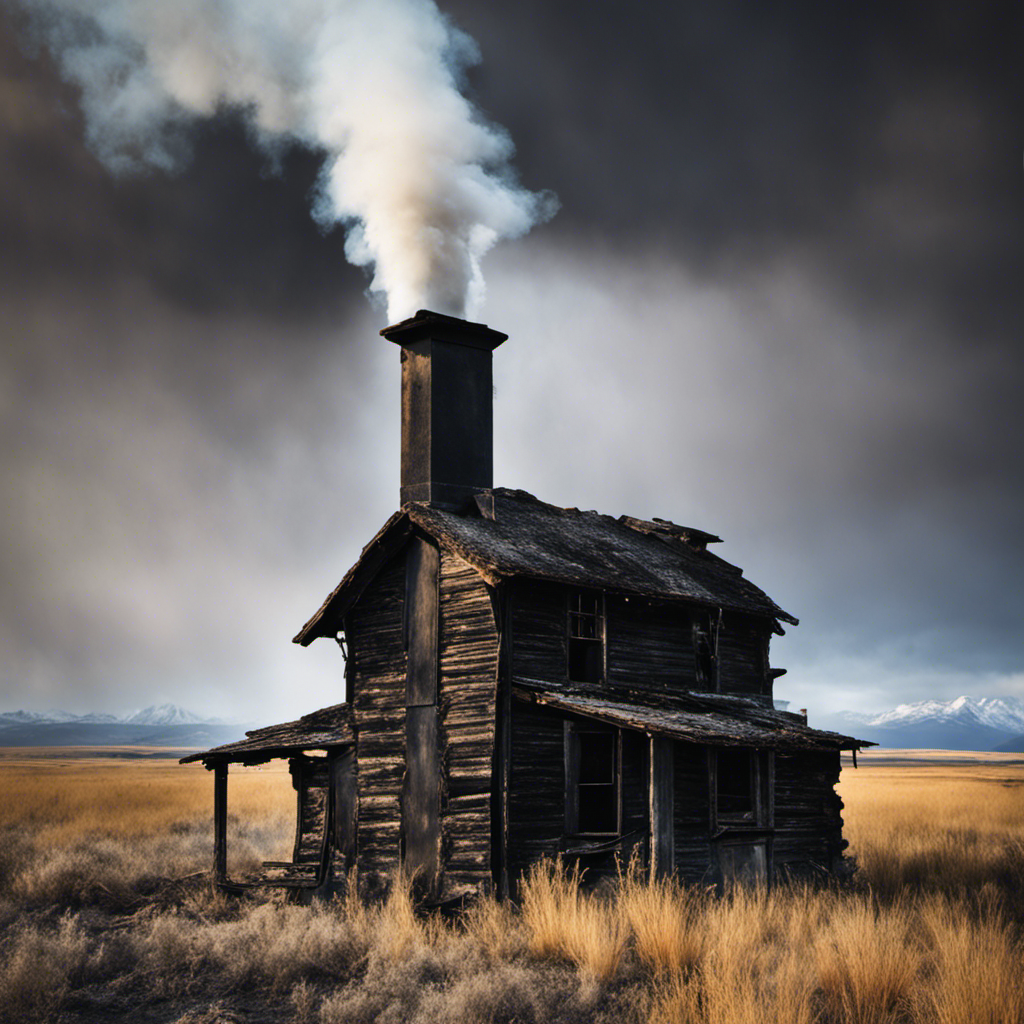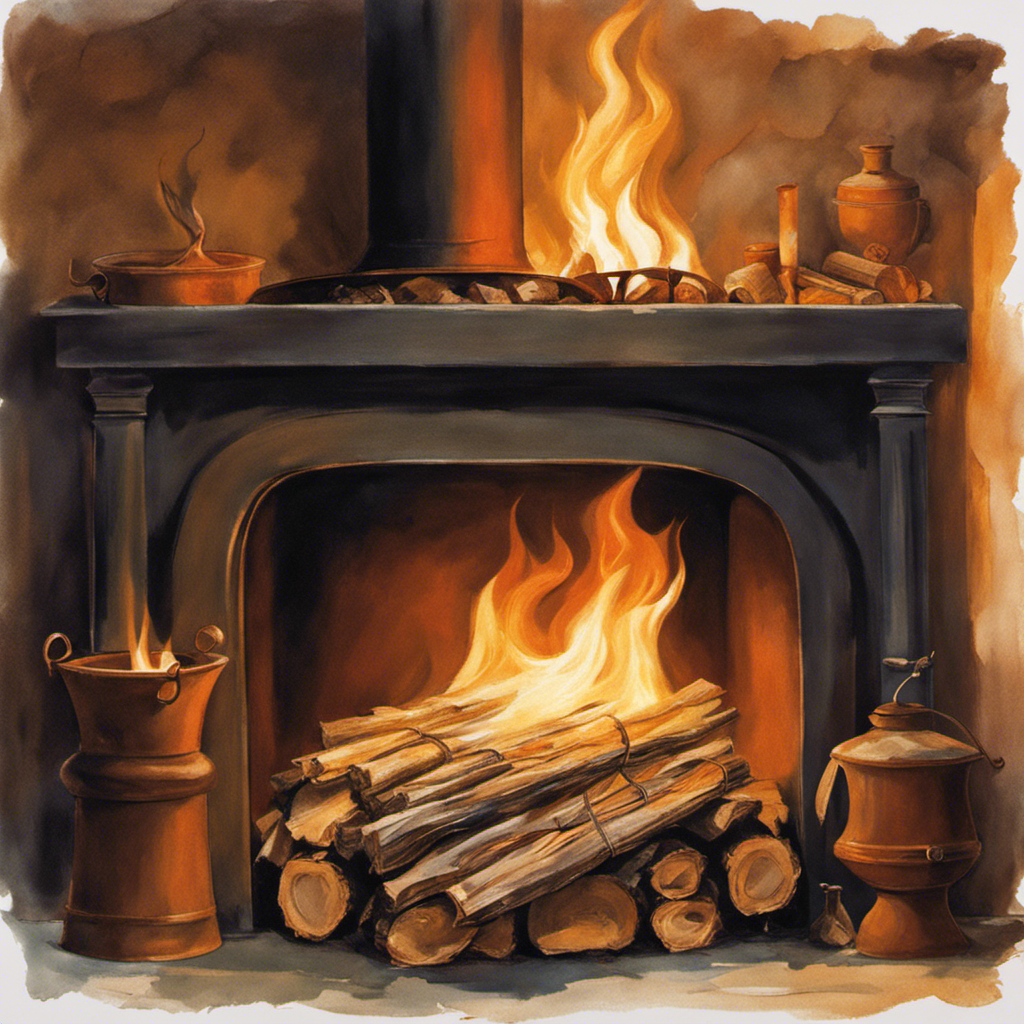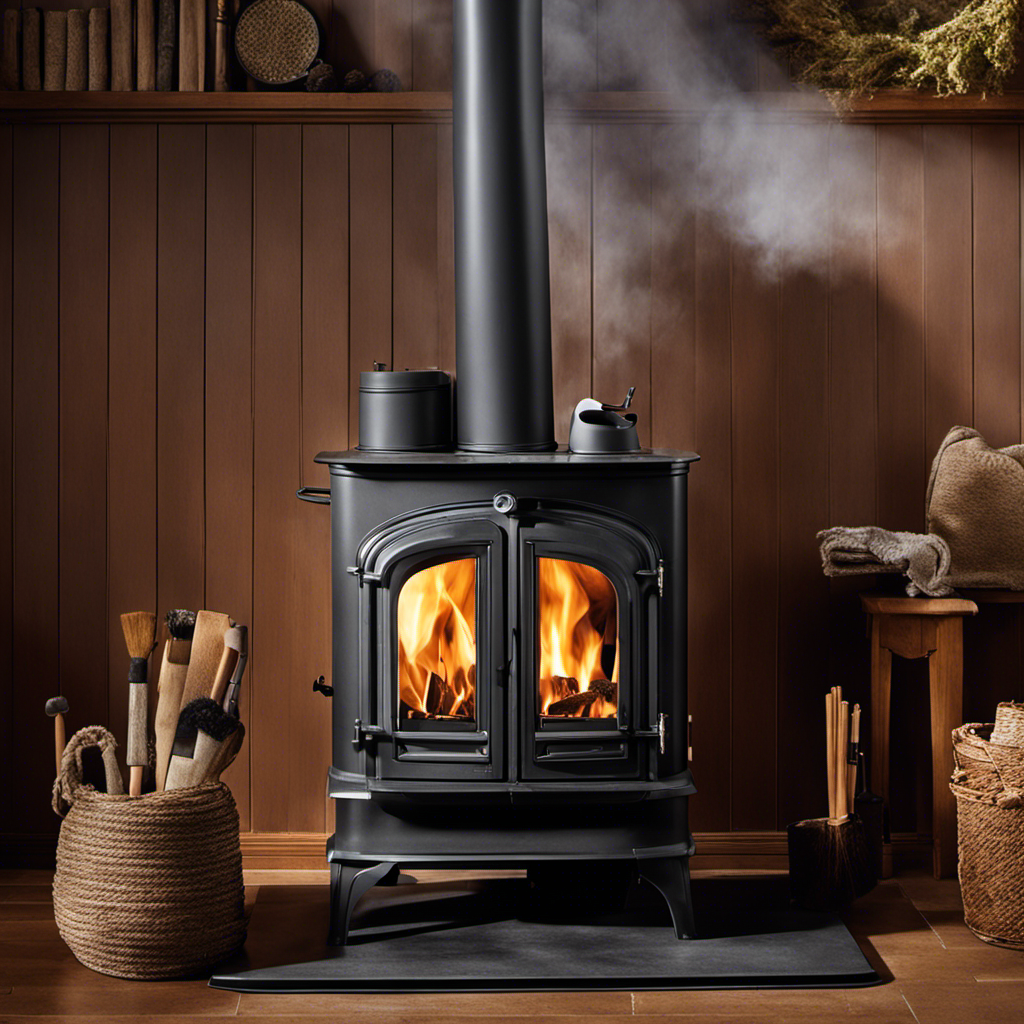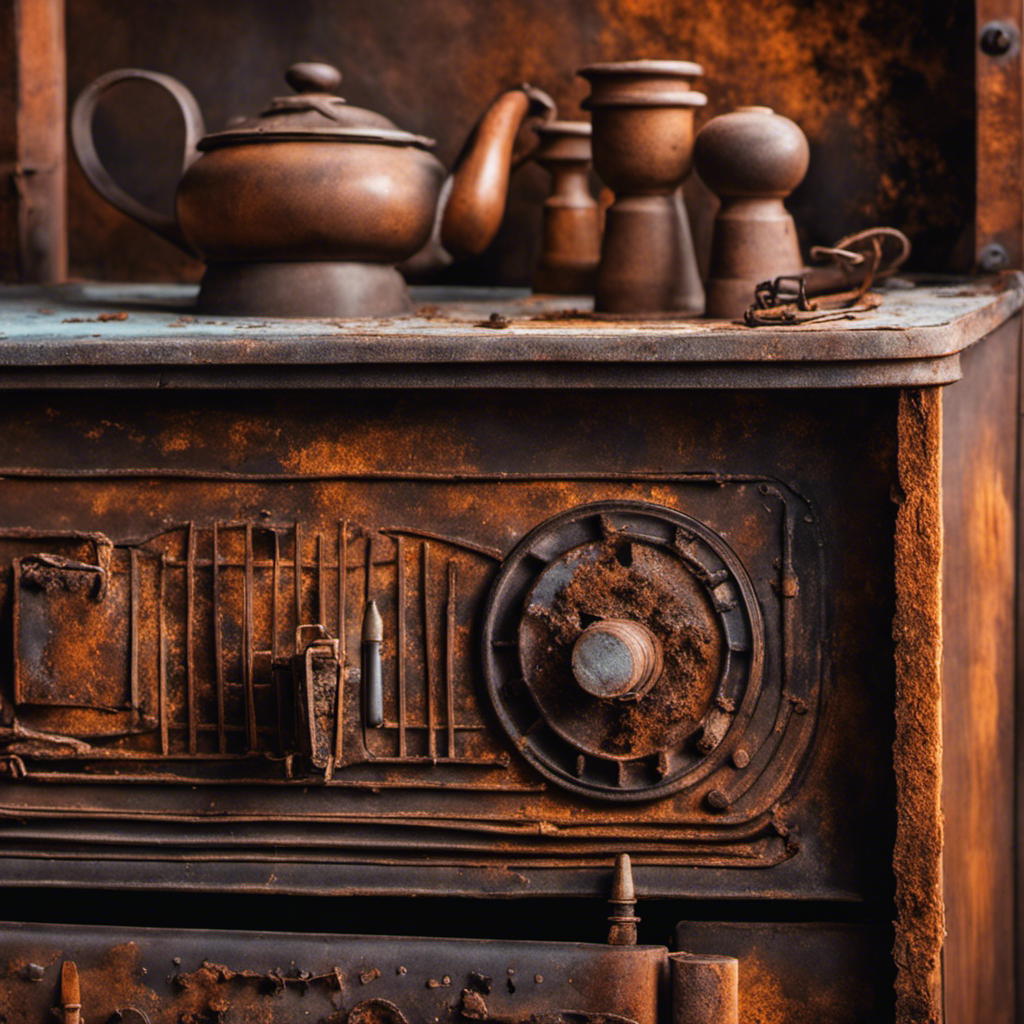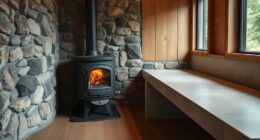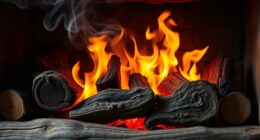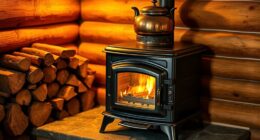I cannot emphasize enough the importance of keeping a wood stove chimney impeccably clean—it’s more significant than one might initially think.
I mean, sure, it’s not the most glamorous task, but trust me, neglecting it can lead to some serious issues. From decreased efficiency to potential chimney fires, the consequences are no joke.
So, how often should you clean your wood stove chimney? Well, stick around because in this article, I’ll give you the lowdown on everything you need to know.
Key Takeaways
- Regular chimney cleaning is important to prevent the buildup of creosote, reduce the risk of chimney fires, improve indoor air quality, ensure proper ventilation, and maintain the safety and efficiency of the wood stove.
- Factors such as usage of the wood stove, type of wood being burned, regular inspections, using proper tools and techniques, and avoiding common chimney cleaning mistakes determine the frequency of cleaning.
- Signs that indicate the need for chimney cleaning include excessive smoke or strong odor, common chimney problems if signs are ignored, and a recommended cleaning frequency of at least once a year. Safety precautions should be taken during cleaning, and hiring a professional chimney sweep is recommended for thorough and safe cleaning.
- DIY chimney cleaning tips include clearing the area around the fireplace, wearing protective gear, inspecting the chimney for damage or blockage, using a chimney brush to remove creosote buildup and debris, and checking the chimney cap and flue for damage or obstructions. Hiring professional chimney cleaning services offers benefits such as expertise in identifying potential issues or damage, necessary equipment and tools, time and effort saved, and the importance of professional chimney inspections for efficiency and safety.
The Importance of Regular Chimney Cleaning
I really understand the importance of regular chimney cleaning.
As a homeowner, I’ve come to realize the numerous benefits of keeping my chimney clean and the potential dangers of neglecting this important maintenance task.
Regular chimney cleaning helps to prevent the buildup of creosote, a highly flammable substance that can lead to chimney fires. By removing this buildup, I can greatly reduce the risk of a dangerous fire in my home.
Additionally, regular chimney cleaning ensures that the chimney is functioning properly, allowing for efficient ventilation of smoke and gases. This helps to improve indoor air quality and reduce the risk of carbon monoxide poisoning.
Overall, regular chimney cleaning is essential for maintaining the safety and efficiency of my wood stove, and I highly recommend it to all homeowners.
Factors That Determine Cleaning Frequency
Determining the factors that influence cleaning frequency is crucial for maintaining the safety and efficiency of my wood stove chimney. Regular cleaning is essential to prevent common chimney cleaning mistakes and reduce the environmental impact of wood stove chimneys.
Factors that determine cleaning frequency:
- Usage: The more frequently I use my wood stove, the more often it needs to be cleaned. Heavy usage can lead to a buildup of creosote and other debris, increasing the risk of chimney fires.
- Type of wood: Burning certain types of wood, such as softwoods or wet wood, can result in more creosote buildup. Using dry hardwoods can help reduce the frequency of cleaning.
Common chimney cleaning mistakes:
- Neglecting regular inspections: Regular inspections are crucial to identify potential issues and address them before they become major problems.
- Using improper tools or techniques: It’s important to use the right tools and follow proper cleaning techniques to avoid damaging the chimney or causing safety hazards.
Considering these factors and avoiding common mistakes will ensure that my wood stove chimney is clean, safe, and environmentally friendly.
Signs That Your Wood Stove Chimney Needs Cleaning
To ensure the safety and efficiency of my wood stove chimney, it’s important to be aware of the signs that indicate the need for cleaning, such as excessive smoke or a strong odor. Ignoring these signs can lead to common chimney problems, including chimney fires and carbon monoxide poisoning.
Regular chimney cleaning is crucial to prevent the buildup of creosote, a highly flammable substance that can accumulate inside the chimney. It’s recommended to have the chimney cleaned at least once a year, or more frequently if you use the wood stove extensively.
When cleaning the chimney, safety precautions must be taken into consideration. This includes using protective gear, such as gloves and goggles, and ensuring proper ventilation. It’s also recommended to hire a professional chimney sweep who’s the expertise and equipment to clean the chimney thoroughly and safely.
DIY Chimney Cleaning Tips and Techniques
Cleaning your chimney yourself can save you money and time. As a homeowner, it’s important to regularly maintain your chimney to ensure it functions properly and safely.
Here is a chimney maintenance checklist to guide you:
- Clear the area around the fireplace and protect your furniture and floor.
- Wear protective gear such as goggles, gloves, and a dust mask.
- Inspect the chimney for any signs of damage or blockage.
- Use a chimney brush to remove creosote buildup and debris.
- Check the chimney cap and flue for any damage or obstructions.
- Clean the fireplace and remove ash and soot.
While DIY chimney cleaning can be beneficial, it’s important to avoid common mistakes such as:
- Neglecting professional inspections and services.
- Using improper tools or techniques.
- Failing to remove all debris and creosote.
- Ignoring signs of damage or blockage.
Professional Chimney Cleaning Services: When to Hire
Honestly, I always hire professional chimney cleaning services to ensure that my chimney is cleaned thoroughly and safely. Professional chimney inspections are essential for maintaining the efficiency and safety of your chimney.
Hiring professionals for this task offers numerous benefits. Firstly, professionals have the expertise and knowledge to identify any potential issues or damage that may have occurred over time. They can detect cracks, leaks, or blockages that may go unnoticed by an untrained eye.
Additionally, professionals have the necessary equipment and tools to clean the chimney effectively. They use specialized brushes and vacuums to remove creosote buildup, which can be a fire hazard.
Moreover, hiring professionals ensures that the job is done correctly and efficiently, saving you time and effort. So, don’t overlook the importance of professional chimney inspections and consider hiring experts for a thorough and safe cleaning of your chimney.
Frequently Asked Questions
How Do I Choose the Right Type of Brush for Cleaning My Wood Stove Chimney?
When choosing a brush for cleaning your wood stove chimney, it’s important to consider the type of chimney liner you have. Proper cleaning techniques vary depending on the liner material.
Can I Use Regular Household Cleaning Products to Clean My Wood Stove Chimney?
I wouldn’t recommend using regular household cleaning products to clean a wood stove chimney. It’s important to avoid common mistakes and use specialized chimney cleaning products for optimal results and safety.
Are There Any Specific Safety Precautions I Need to Take While Cleaning My Wood Stove Chimney?
When cleaning my wood stove chimney, I always prioritize safety. It’s important to wear protective gear, like gloves and goggles, and use proper tools. Avoid common mistakes like not properly extinguishing the fire beforehand.
How Often Should I Inspect My Wood Stove Chimney for Any Potential Issues?
I clean my wood stove chimney at least once a year to prevent potential issues. Regular inspections are important to ensure proper functioning. To clean it properly, I follow recommended guidelines to ensure safety and efficiency.
Is It Necessary to Hire a Professional Chimney Cleaning Service, or Can I Clean the Chimney Myself?
I can clean the wood stove chimney myself, but hiring a professional chimney cleaning service has its benefits. DIY chimney cleaning offers cost savings, but professionals have the expertise to ensure thorough cleaning and identify potential issues.
What are the Best Methods for Cleaning the Surface of a Wood Stove?
Cleaning a wood stove surface can be done effectively using a few methods. Firstly, use a soft brush or vacuum to remove loose debris. Next, wipe the surface with a damp cloth soaked in a mixture of dish soap and warm water. For tougher stains, consider using a specialized stove cleaner or a mixture of vinegar and water. Lastly, ensure the stove is completely dry before reassembling and using it again.
Is It Necessary to Close the Chimney When the Wood Stove is Not in Use?
Closing the chimney when the wood stove is not in use is crucial to prevent heated air escape without wood stove, saving energy and reducing utility bills. By sealing the chimney properly, you can avoid drafts and maintain a comfortable indoor temperature.
Conclusion
In conclusion, regular chimney cleaning is crucial for the safety and efficiency of your wood stove. Factors such as usage, type of wood, and weather conditions determine how often you should clean your chimney.
Look out for signs like smoke backing up or a strong odor to know when it’s time for cleaning. While DIY cleaning is possible, hiring a professional chimney cleaning service ensures a thorough and safe job.
So, when was the last time you had your wood stove chimney cleaned?

